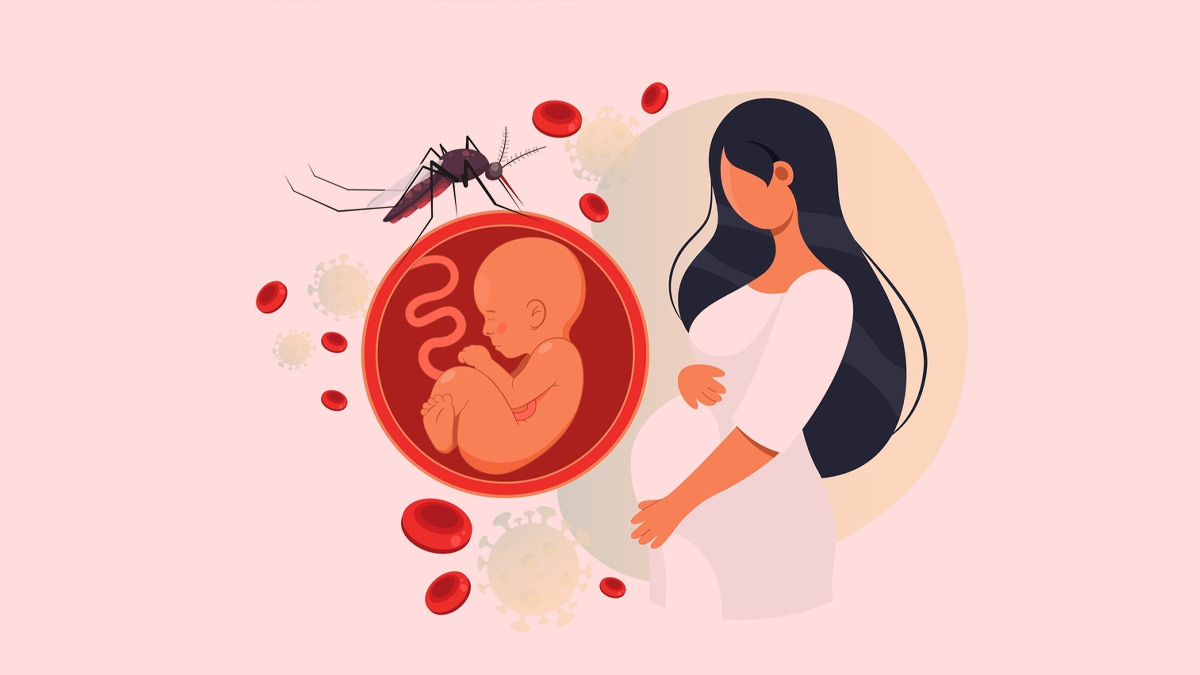
Did you know that Zika virus infection during pregnancy can cause serious birth defects, including microcephaly and hearing loss? The primary transmission mode for this flavivirus is through the bite of infected Aedes mosquitoes. However, it can also spread through sexual contact, blood transfusions, and from mother to child during pregnancy. We spoke to our expert Dr Sonam Simpatwar, MBBS, Diploma in OBGY (DGO), MS, Dr Babasaheb Ambedkar Memorial Railway Hospital, Byculla, Mumbai, who shared some essential things to know about the Zika virus and its impact on pregnant women and their babies.
Table of Content:-
Things to Know About Zika Virus Consequences During Pregnancy

Microcephaly and Other Birth Defects
According to the World Health Organization, Zika virus infection during pregnancy can lead to microcephaly (a condition where a baby's head is much smaller than expected) and other congenital malformations in infants, such as limb contractures, increased muscle tone, eye abnormalities, and hearing loss. These clinical features are collectively known as congenital Zika syndrome.
The exact risk of congenital malformations following Zika infection during pregnancy is still uncertain. It is estimated that 5–15% of infants born to women infected with the Zika virus during pregnancy show evidence of Zika-related complications, said Dr Simpatwar.
Transmission to the Foetus
Dr Simpatwar added, "The Zika virus can pass from a pregnant woman to her foetus via the placenta. This vertical transmission can occur at any stage of pregnancy, although the risk and severity of birth defects are higher if the infection occurs during the first trimester."
According to a 2019 study, Zika virus has been detected in both semen and vaginal secretions. The virus remains longer in semen (3 months) compared to the female genital tract (2 months), which is why the guidelines for preventing sexual transmission differ for men and women.
Also Read: A New Device Can Detect Zika Virus Through Smartphone

Timing of Infection
Dr Simpatwar highlighted, "The timing of the Zika infection during pregnancy is crucial. Infections during the first trimester are most strongly associated with severe birth defects, including microcephaly. However, infections in the second and third trimesters can also result in significant complications, although they may be less severe or manifest differently, such as developmental delays or other neurological issues detected after birth."
According to a 2024 study, if you are planning to become pregnant, it is advisable to delay trying to conceive after a known or possible exposure to the Zika virus. The Centers for Disease Control and Prevention (CDC) recommends that females wait at least two months and males wait at least three months, even if they do not exhibit symptoms. During this waiting period, it is important to use barrier methods (such as condoms) and effective birth control to prevent pregnancy and protect their sexual partners from the virus.
Asymptomatic Infections
Many people infected with the Zika virus, including pregnant women, may not show any symptoms. According to a 2024 study, the Zika virus does not cause symptoms in 4 out of 5 cases.
"Asymptomatic infections complicate the situation because the absence of symptoms does not mean there is no risk to the foetus. Pregnant women in areas with active Zika transmission or those who have travelled to such areas should undergo regular screenings and ultrasounds to monitor foetal development," said Dr Simpatwar.
Also Read: What Is Zika Virus? Know The Symptoms, Causes, Treatment, And Prevention
Miscarriage and Stillbirth
Zika virus infection during pregnancy can increase the risk of miscarriage and stillbirth. "The exact mechanisms are not fully understood, but it is believed that the virus can damage the placenta or disrupt blood flow to the foetus, leading to these tragic outcomes. Pregnant women with Zika should receive comprehensive prenatal care to monitor for these risks," added Dr Simpatwar.
Long-term Neurodevelopmental Issues
Babies born to mothers infected with the Zika virus during pregnancy are at risk for long-term neurodevelopmental issues, even if they do not have microcephaly at birth. These issues can include seizures, intellectual disabilities, motor and sensory impairments, and behavioural problems. Early intervention and ongoing monitoring are crucial to managing these potential outcomes.
Prevention Measures

According to Johns Hopkins Medicine, the most effective way to protect yourself from the Zika virus is to avoid travelling to countries experiencing outbreaks. If travel to an affected area is unavoidable, take the following steps to prevent mosquito bites:
- Cover your skin by wearing long sleeves and long trousers.
- Stay indoors in rooms with screens or air conditioning as much as possible.
- Use mosquito netting.
- Pregnant women can safely use Environmental Protection Agency-approved insect repellent containing DEET or picaridin, or wear clothing treated with permethrin.
[ Disclaimer: This article contains information provided by an expert and is for informational purposes only. Hence, we advise you to consult your own professional if you are dealing with any health issues to avoid complications.]
Also watch this video
Read Next
Kourtney Kardashian Reveals Fetal Surgery Scar In Maternity Photoshoot; What Is Fetal Surgery?
How we keep this article up to date:
We work with experts and keep a close eye on the latest in health and wellness. Whenever there is a new research or helpful information, we update our articles with accurate and useful advice.
Current Version